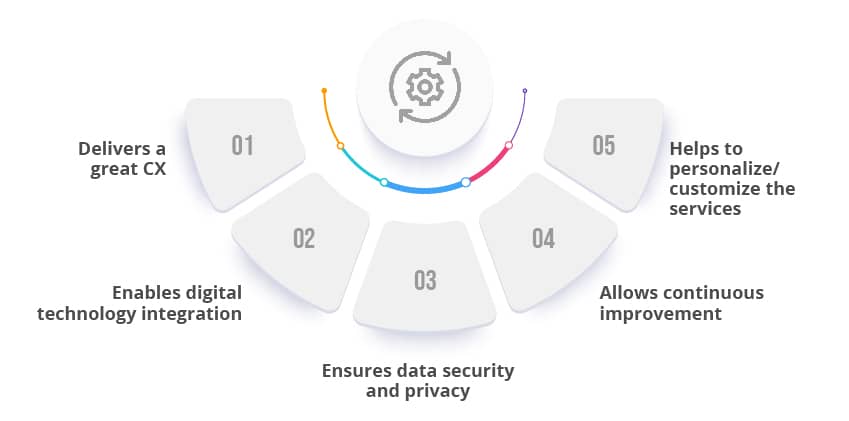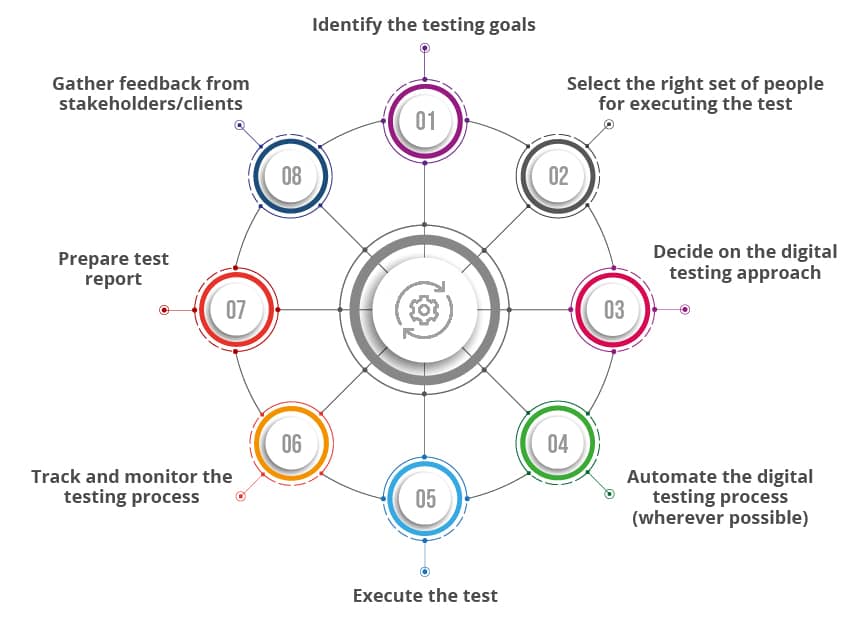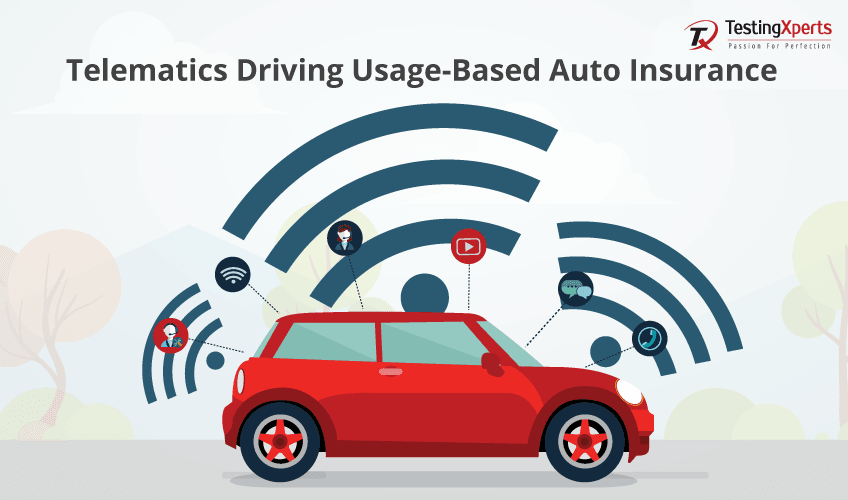 Table of Contents
Table of Contents
- What is digital testing?
- How digital testing helps in enabling effective digital transformation?
- Digital Testing Role in Enhancing the CX Across Industries
- What should be an ideal digital testing strategy?
- Digital testing tools for businesses in 2022
- Conclusion
- How can TestingXperts (Tx) help?
In today’s highly competitive world with digital transformation at its peak, every business needs high-quality digital apps to deliver a seamless Customer Experience (CX). However, for organizations to deliver a seamless CX, effective performance, high-quality and robust security of digital apps is essential. This is where digital testing comes into the picture. Digital testing enables end-to-end testing of applications which improves their quality, performance and security. It ultimately helps businesses deliver a great CX. But before deep-diving into the role of digital testing for enhancing CX, let’s understand what digital testing means.
What is digital testing?

Digital testing is a specialized software testing type that covers the entire gamut of software testing methods. It involves both functional and non-functional testing of software and ensures the app functions seamlessly under all conditions. This testing method ensures end-to-end testing of digital apps and platforms.
Businesses can leverage various digital testing methods to test digital apps, including regression testing, automation testing, performance testing, security testing, big data testing, cross-browser testing, etc. Since this type of testing covers the entire range of software testing types, it is in high demand across industries. Thus, digital testing methods have more dominance in today’s market, and their usage is said to increase in the coming years.
1. According to BusinessWire article, the digital assurance market size is expected to grow from USD 2.90 Billion in 2017 to USD 5.47 Billion by 2022, at a CAGR of 13.5% during the forecast period of 2018-2022. The significant growth in the market size of digital testing is due to the increase in digital transformation initiatives, rising use of DevOps and agile application development methodologies, and increase in the test automation methods.
2. According to Verified Market Research, The Global Digital Assurance Market was valued at USD 3.18 Billion in 2018 and is projected to reach USD 8.51 Billion by 2026, growing at a CAGR of 13.10% from 2019 to 2026. The major forces driving the growth are the growing need for Application Programming Interface (API) monitoring in the digital economy, increasing use of DevOps and agile application development methodologies in various application areas, the increasing test automation for lower operational costs and better quality assurance.
How digital testing helps in enabling effective digital transformation?

As more and more businesses continue to increase their digital transformation initiatives, it has become necessary for businesses to leverage digital testing. Below mentioned are some ways in which digital testing enables businesses to achieve effective digital transformation.
1. Delivers a great CX-
Any app should deliver seamless CX, one of the most important elements of digital transformation. Digital testing helps businesses to ensure their digital apps and platforms work flawlessly and provide a great CX.
2. Enables digital technology integration–
For effective digital transformation, adoption and integration of digital technology are essential. Digital testing ensures seamless integration of the latest digital technology stack across the organization.
3. Ensures data security and privacy–
Data security or data privacy is the key concern for today’s businesses. Digital testing helps ensure data security by enabling robust checking of apps against security loopholes, vulnerabilities, or other privacy issues.
4. Allows continuous improvement –
Digital testing involves end-to-end testing of the software that enables early identification of bugs and removal of defects. Performing this testing in the DevOps environment helps to continuously improve software quality.
5. Helps to personalize/customize the services –
To ensure effective digital transformation, businesses must deliver personalized or customized services to customers. Digital testing helps businesses gain customer insights and provide customized services tailored according to their customer needs.
Evidently, for every digitally transforming business, this testing is necessary for enabling an improved CX. Let us understand the role of digital testing in enhancing the CX across industries.
Digital Testing Role in Enhancing the CX Across Industries
Healthcare –
There are some common challenges associated with healthcare apps that hampers CX, such as usability issues, implementation issues, integration issues, etc.
By leveraging digital testing, the usability of apps can be improved significantly.
It will also ensure proper integration of apps with other medical devices, which ultimately helps the healthcare sector improve the CX.
Telecom –
Telecom apps face common challenges such as the complexity of underlying API layers, lack of network security, numerous pending customer requests, etc.
Leveraging digital testing validates the underlying layers of telecom apps and ensures the upkeep of network security.
Typically, this testing method helps telecoms improve app quality, thus enabling faster responses against customer queries and significantly improves the CX.
Banking and Finance –
The banking and finance sector continue to face specific challenges with their apps like frequent timeouts, app crashes, transaction failures, security of customer-sensitive data, etc.
Digital testing can help the banking and finance sector get high-quality and secure banking apps that do not crash or lead to transaction failures.
Digital testing will also ensure the safety of customer data by enabling security and thus delivers a great digital banking experience to customers.
Retail and eCommerce –
Common challenges associated with retail and eCommerce apps include issues with performance/load issues, user interface issues, navigation issues, network issues, which significantly hamper the UX.
By leveraging digital testing, businesses can get high-performing eCommerce apps that work well under varying user loads, fluctuating networks, or varying bandwidths.
Digital testing will also improve the user interface and navigation of the app, thus enabling the delivery of a great CX.
Media and Entertainment –
The media and entertainment sector face challenges with their apps due to the lack of digital technology integration, lack of personalized content delivery, and poor third-party app integrations.
By leveraging digital testing, businesses can get high-quality entertainment apps with proper technology integrations (AI, ML, Virtual Reality (VR), etc.)
Also, by leveraging this method of testing, stakeholders can gain customer insights and offer personalized streaming services to customers, enhancing the CX.
Undoubtedly, this testing plays a significant role in enhancing the CX across industries. But for businesses to start digital testing, a solid digital strategy is required.
What should be an ideal digital testing strategy?

1. Identify the testing goals:
Even before starting the digital testing process, it is essential to decide the testing goals. The testing goals can include various aspects of the software such as functional, non-functional, security, usability, performance, UI/UX, etc.
2. Select the right set of people for executing the test:
For a successful digital testing process, it is essential to have the right set of people in the team. Ensure the selected candidates have the right skills, technical expertise, and proper experience with this testing process.
3. Decide on the digital testing approach:
It is essential to decide the right testing approach that should be followed during the testing process. Decide between the exploratory and scenario-based testing to avoid confusion at the later stages.
4. Automate the digital testing process:
Try to automate the testing processes wherever possible. This will ensure a faster software testing process, with increased test coverage, and will also lead to the delivery of high-quality software.
5. Execute the test:
While executing the tests, make sure all the scenarios are tested thoroughly to ensure no compromise with the quality of the software.
6. Track and monitor the testing process:
For a successful digital testing process, it is essential to keep track of the software testing process. If required, change the testing strategy as per the need, and track the results.
7. Prepare test report:
Once the testing process gets completed, prepare a test report, and share it with the respective stakeholders. The test report must include no. of test cases passed or failed, no of bugs identified, no of bugs rectified, etc.
8. Gather feedback from stakeholders/clients:
After sharing the test report with the respective stakeholders, their feedback should be collected. This feedback will help testers to improve the software testing process further.
Once the strategy is prepared, businesses can start the digital testing process. Below mentioned includes the range of digital testing types that enterprises can leverage.
Types of Digital Testing
1. Functional testing –
These tests are performed to check the functional aspects of the software. Some of the functional testing types are:
– Unit testing –
This test is performed to validate the functionality of the smallest possible unit of the software under isolation.
– Integration testing –
In this test, various software units are integrated to ensure their stability and functionality after integration.
– Regression testing –
This test ensures that the recent changes have not broken any existing functionality. It helps to find bugs in a new software release and ensures that the previous bugs are fixed.
– Mobile application testing –
The main aim of end-to-end mobile app testing is to ensure the functionality, security, performance, compatibility, and usability of mobile apps is seamless to deliver a great CX.
2. Non-functional testing –
These tests cover the non-functional aspects of the software that affects the software performance. Some of the non-functional software testing types are:
– Performance and load testing –
The main aim of this test is to check the performance, speed, responsiveness, stability, and reliability of the app under high user loads, fluctuating networks, and varying bandwidths.
– Security testing –
This testing method helps to identify and remove possible security loopholes or vulnerability issues from the software.
– Usability testing –
This test aims to ensure proper navigation and content visibility across the app to ensure a smooth flow across the app for better CX
– Accessibility testing –
This test aims to ensure equal access of apps to people, including people with certain disabilities like visual, hearing, cognitive, motor limitations, etc. This testing method ensures apps comply with accessibility regulations and guidelines like W3C’s; WCAG 2.0, WCA 2.1, WCAG 2.2, Section 508, and Stanca Act.
Digital testing tools for businesses in 2022
Selenium –
It is one of the leading automation testing tool suites that has various components, namely, Selenium IDE, Selenium WebDriver, and Selenium Grid. It supports multiple languages, multiple OS, and browsers and can work seamlessly on all hardware.
Appium –
It is an open-source tool that is used for the functional testing of iOS and Android mobile applications. This tool allows cross-browser application testing of native, hybrid, and web applications. Appium supports multiple languages such as PHP, Java, Python, Ruby, etc.
UiPath Test Suite-
It is an advanced automation testing tool suite with various components: Test Manager, Studio Pro, Orchestrator, Robots, and other Test Studio components. By leveraging UiPath test suite-based test automation, businesses can get up to 30% faster test execution, 40% less maintenance effort, and 70% faster test creation.
Veracode –
It is one of the best automated, on-demand application security testing and code review solution. This testing tool provides various ways to manage security risks across the entire web application. Veracode recommends both static and dynamic scans for web applications with its advanced scan features.
Apache JMeter-
It is open-source software that is a simple java application used to test the load functional behaviour of apps. The tool is used to measure the performance of both static and dynamic resources or web applications. This automated software tool is used to stimulate the heavy load on servers and networks to check the strength and performance under different load types.
aXe –
It is an open-source accessibility testing tool for Firefox and Chrome browsers. This tool helps to find the intensity of each bug that violates the accessibility compliances.
Userlytics –
It is a well-known user testing platform that collects feedback from real users to improve application performance. This tool contains various features such as advanced video capturing and editing options, tree testing and code sorting, live conversations, etc.
Conclusion
The main motive of every digitally transforming business is to deliver a great CX. Therefore, every activity of digital transformation revolves around the improvement of CX. For enterprises to ensure the delivery of great CX, digital testing is essential. Businesses can leverage digital testing from a next-gen QA and independent software testing service provider for high-quality digital solutions.
How can TestingXperts (Tx) help?

TestingXperts (Tx) has been at the forefront of enabling digital testing services for businesses across industries. With proven experience in mobile & web app testing services and an end-to-end service portfolio, Tx can address various challenges associated with digital apps like functionality, performance, security, usability, and cross-device compatibility. Tx closely works with clients adopting Agile and DevOps. Tx ensures businesses achieve faster time-to-market with highly secure, stable, and robust digital applications.
Our Differentiators:
• End-to-end services portfolio for digital applications
• 10+ years of test automation expertise with more than 500+ test automation experts
• Experience with all industry-leading tools for functional testing, performance testing, security testing, and test automation
• Follow a user-centric testing approach
• Teams have rich experience in web, mobile, and SMAC applications testing
• Fully equipped mobile test lab with 350+ devices
• Detailed custom reports to help stakeholders to make informed decisions
• Seamless customer support available 24×7
Discover more
Get in Touch
Stay Updated
Subscribe for more info




